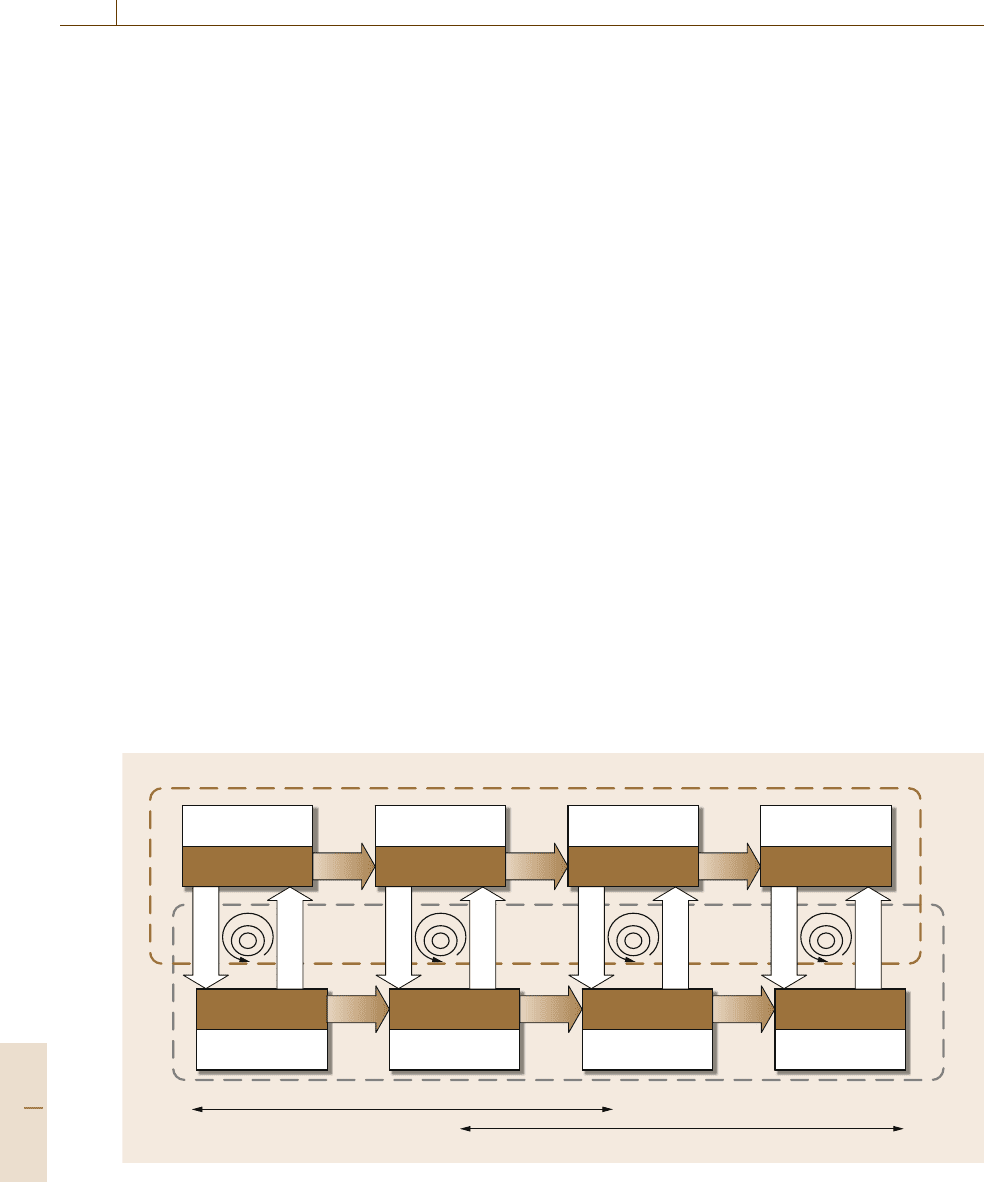Nof S.Y. Springer Handbook of Automation
Подождите немного. Документ загружается.


Automation and Ethics 47.4 Ethical Analysis and Evaluation Steps 815
Ethicalcase
Dimensions of ethical issues
Privacy Property Quality Accessibility
1. Company data base highlights employees’ personal attributes,
e.g., nearing retirement, potentially being discriminatory. Further-
more, who needs to know this information? Who is authorized to
access it?
√√
2. Service providers monitor employees’ access to certain web-
sites. Employees cannot prevent being monitored while using
company computers; employers may abuse the gathered private in-
formation.
√√ √
3. Organization audits individuals’ use of unauthorized soft-
ware, either to create policies, protect itself from property lawsuits,
or monitor individual private behavior.
√√
4. Company is using automated imaging technology to replace
employees. This case illustrates a typical conflict between econ-
omy, accuracy, and efficiency goals achievable with automation, and
the loyalty to dedicated employees (who will lose access to work
with automation).
√√
5. New automatic sorter hashidden design deficiencies that a re
too costly to repair after deployment of thousandsofsuch de-
vices. This case is common, as evident by some ethical companies
occasionally recalling defective automation equipment for upgrade
and repair. If there is no recall in such cases, clients and users are
denied access to better quality and safer equipment.
√√
6. A robot controller, under certain undisclosed conditions,
will cause substantialchemicalwaste and pollution. This
multi-dimensional ethical problem, involving issues of significant
potential damages to life, life quality and property, possibly deny-
ing access to inflicted areas and properties, and potentially costing
also in major remedial and recovery efforts, is illustrated by cases
of whistle blowers, ethical individuals who risked their employment
to warn about imminent hazards.
√√√
7. Company hassuperior medical automation technology but
will not produce it for several years till it recovers all previous
investments in the inferior product currentl
y being marketed
to hospitals. This case is similar to Case 6, except it is a different
scenario.
√√√
8. A vending machine delivers (a) the right item, butreturns
too much change; (b) the wrong item, and no change. Ethical
dilemmas are caused by automation’s dysfunctional quality.
√
9. A manager blames automation for faulty packaging. Is au-
tomation to blame, or is it its designer/implementer/user?
√
10. A student blames the school’s computer for lost homework.
Ethical challenges concerning work quality (and computer automa-
tion quality) are posed to both the student and the instructor.
√
11. (Think of an ethical dilemma with your home automation.)
12. (Think of an ethical dilemma unique to your organization’s use
of automation.)
Part E 47.4

816 Part E Automation Management
Table 47.3 Examples of conflicts between ethical values and principles
Values/Principles Illustration
in conflict
1. Short versus long term Software patch solving security problems now but causing hazards later
2. Individual versus community Wasteful exploitation of resources harming later generations
3. Justice versus mercy Charging for mass email to prevent spamming
4. Privacy versus convenience Reading the fine details of use-contracts for each downloaded software
5. Loyalty versus truth Divulging harmful private or proprietary information gained in confidence
6. Loyalty to present Sharing knowledge about relative advantages or shortcomings of design
versus former organization or applications
(employer)
7. Efficiency versus safety Higher speed limits and lower weight versus automobile accidents’ severity
that works well for some situations may not
work well, or may work only partially well for
the same situations under different conditions(it
is a conditional solution); or not work well at
another time period (it is a time-dependent solu-
tion). In analyzing potential outcomes, one may
consider the conflicts arising between wrong
and right solutions or decisions, between two
wrong solutions or decisions, and between two
right solutions or decisions. Examples of such
ethical conflict analyses are illustrated in Ta-
ble 47.3.
In analyzing ethical conflicts, usually the conflicts
between two or more right solutions, or between two or
more rightvalues,pose the most complicated dilemmas.
Table 47.4 Seven ethics principles
Principle’s name Ethical principle imperative/lesson
1. Hillel the Elder’s principle Do not do to others what you do not want to be done to you.
2. The Golden rule Do to others what you would accept if done to you.
3. Immanuel Kant’s If an action is not right for everyone (in a team, or group, or community) to
categorical imperative take, then it is not right for anyone.
4. Descartes’ rule of change If an action cannot be taken repeatedly (e.g., a small action that may snowball
out of control), it is wrong to take it at any time.
5. Utilitarian principle Decide on the action that leads to the higher, or greater, or more significant
value (if values can be prioritized, and if consequences can be predicted).
6. Risk aversion principle Decide on the action that leads to the least damage, or the smallest hazard.
7. No Free Lunch rule Respect the ownership of tangible and intangible assets, and if ownership is
unknown to you, assume somebody owns assets that do not belong to you.
For example, decisions in examples 1 and 5, which may
be relatively simple when the potential hazard is enor-
mous. The situations are also relatively more complex
when multiple conflicts combine, e.g., individual ver-
sus community for short versus long term implications.
Additional guidance is offered by ethics principles.
47.4.1 Ethics Principles
Numerous ethics principles have evolved since ancient
times, and have been suggested by ethics philosophers
and scholars. Seven of the well known principles are
listed in Table 47.4.
Principles (1) and (2) are considered the individual
fairness principles. Principle (3) is similar to (2), but
stated from a group aspect. Principle (4) represents the
Part E 47.4

Automation and Ethics 47.5 Ethics and STEM Education 817
impact of time and changes over time (at least those
changes that are predictable. Principle (5) addresses
the issue of conflict between several objectives and
principles, and maximizing the value of consequences.
Principle (6) is similar to (5) but from the aspect of
minimizing damage. Finally, principle (7) addresses the
value and concern for intellectual property protection,
on par with physical property protection, as a fair prin-
ciple for a globally sustainable society.
The above principles provide some guidance for
initial analysis. Often, however, they may point to con-
flicting strategies, and individuals still need to carefully
weigh their decisions and take responsibility for each of
their decisions.On theother hand,these basic principles
offer clear tests for actions and decisions that should not
be followed if they fail these tests.
47.4.2 Codes of Ethics
To address the complexities of ethical issues, corpo-
rations and organizations define, accept, and publicize
their code of ethics [47.10, 21–23]. Such a code pre-
scribes values to which the organization or corporation
members are supposed to adhere. The typical struc-
ture of a code of ethics closely related to automation
is illustrated in the Appendix. Examples of codes
of ethics in different countries are included on the
USA National Academy of Engineering site ([47.21],
http://onlineethics.org). Values that may be incorpo-
rated in a code of ethics include:
•
Care for others
•
Compliance with the law
•
Consideration of cultural differences
•
Courtesy
•
Fairness
•
Honesty
•
Integrity
•
Loyalty
•
Reliability
•
Respect for sustainable environment
•
Trustworthiness
•
Waste avoidance and elimination.
General moral imperatives that are included in a code of
ethics are listed as follows:
•
Follow fairness principles
•
Contribute to society and human well-being and
sustainability
•
Avoid harming others
•
Be honest and trustworthy
•
Honor property rights including copyrights and
patents
•
Give proper credit to intellectual property
•
Access automation resources only when authorized
•
Respect the privacy, diversity, and rights of others.
47.5 Ethics and STEM Education
I didn’t know I was a slave until I found out I
couldn’t do the things I wanted. (Frederick Dou-
glass)
Rapid advancements in automation have led to signif-
icant challenges, as indicated earlier in this chapter.
Automation has also influenced changes to demograph-
ics, and the creeping of problems associated with
student and employee recruitment, retention, and fo-
cused funding. Good educational preparation in the
science, technology, engineering, and mathematics
(STEM) disciplines is one of the primary means avail-
able to prepare the workforce to compete globally for
highly skilled technology-based and automation-based
jobs. In their current work environments, not only do
students need to understand and deal with the increased
knowledge expectations from the workforce, but they
need to also understand and deal with the pervasive and
dominant role of automation technology within their
chosen fields, and operate effectively in an increasingly
multi-cultural and multi-ethnic, global environment. In
these jobs, softer skills, which relate to how we go
about getting things done, being language, society, and
culture-sensitive, are becoming equally important as
the hard functional skills (e.g., programming, problem
solving, techniques selection, modeling) that have tra-
ditionally defined what it means to be competent in
a chosen professional field. The widespread globaliza-
tion of the job market calls for future employees to
be adaptive, curious, and nurturing so as to work ef-
fectively in a team, which may be either co-located or
geographically separated.
Part E 47.5

818 Part E Automation Management
47.5.1 Preparing the Future Workforce
and Service-Force
I cannot tell anybody anything; I can only make
them think. (Socrates)
Many organizations, for profit and not-for-profit, now
realize that hiring workers who have been trained
to understand international issues, specifically from
an ethical and cultural perspective, will provide their
businesses and services the necessary competitive-
sustainable advantage in a global society and global
market. For example, conducting transactionsin another
country can be riddled with cultural issues that require
deft personal touch, such as demonstrating appropriate
hospitality, and respecting cultural and religious diver-
sity. Thus, the future in many professional disciplines is
not inmerely a collectiveability to prepare and graduate
good designers, programmers, practitioners, managers,
and technologists – these skills have now become com-
modities thatcan be outsourced. It liesis in the abilityto
prepare entry-level employeesand continuingeducation
employees who are highly comfortable with the theory,
can appropriately blend it with necessary practice and
possess an understanding of both the business culture
and the social issues involved, while being able to ef-
fectively share, communicate, articulate, and advance
their ideas for an innovative product or solution. Hence,
howwe educatestudents to become such successful em-
ployees and entrepreneurs, while acting ethically in the
global economy and society is an important considera-
tion, often better taught through the use of appropriate
case studies.
The rapidly emerging and evolving, and highly
sensitive global economy is profoundly affecting the
employment patterns and the professional lives of
graduates. Thus educating the future workforce to un-
derstand such issues in a global context is becoming
a highly sought-after experience and a critical differen-
tiator in their employability, often testing their ability
to bridge discipline-specific theoretical research issues
with real-world practice, including addressing and re-
solving ethical dilemmas, as reflected by the inundation
of single and multi-semester capstone projects in many
disciplines. While it has been widely reported that
despite intensifying competition, off shoring between
developed and developing countries can benefit both
parties, many students from western countries have
shunned STEM careers because they fear that job op-
portunities and salaries in these fields will decline.
Thus, education is confronted with needing to provide
students with higher-order technological skills aptly
blended withthe considerationof emerging socialneeds
across the globe to provide much needed experiences to
thrive in the future, as well as be frontline contributors
to the technologically and ethically savvy workforce.
A fundamental change in the education of future
workforce and service-force is necessary to assure that
we are well prepared for the increasingly more pro-
fessionally demanding roles. These demands relate to
success in the job market, responsibilities toward em-
ployers, customers, clients, community and society, and
responsibilities as developers of powerful and pervasive
automation technologies. In addition to strong technical
and management skills, future software and automation
designers need the skills to design customized products
and integrated services that meet the diverse needs of
a multi-cultural, multi-ethnic, and increasingly smaller
world united by rapid scientific and technological ad-
vances, and facing globally and tightly inter-related
hazards and challenges. These trends come with un-
foreseen social and ethical challenges and tremendous
opportunities.
47.5.2 Integrating Social Responsibility
and Sensitivity into Education
Effectively integrating social-responsibility, sensitiv-
ity and sustainability into our educational curricula
has become essential for employers and organization
leaders [47.32, 35–37]. See also, for example, the
IEEE and ACM model curricula in the context of
automation (IEEE.org, ACM.org). Students, trainees,
and employees need the diverse exposure to problems
and ideas to develop a broad, yet pragmatic vision of
the technologically-shifting employment and business
landscape. A case study-based approach to teaching,
training, and inculcating ethical behavior can provide
adequate opportunities to develop the necessary soft
skills for being successful in the global service and
workplace. Such an exposure can vastly benefit those
who mayvery well be charged withdeveloping policies,
priorities, and making investments that can help regions
and nations to remain competitive and integrated in the
global automation systems and services industry.
Many STEM curricula, in response to these grow-
ing industry needs,have placed emphasis on team-based
projects and problem-based instruction styles. How-
ever, these projects have their own bag of pit falls;
for example, in project-based software development
classes students often epitomize software development
as building the best solution to address customers’ re-
Part E 47.5

Automation and Ethics 47.5 Ethics and STEM Education 819
quirements. In the following section, a dilemma-based
case study approach that goes beyond a project-based
curriculum is described. It encouragesstudents toreflect
upon the social and ethical ramifications of technology,
expanding the narrow, functional-focused tunnel vision
that currently (subliminally) exists across many com-
puting and automation curricula, and the automation
and software industry, in particular. This is an attempt
to address some specific concerns that arise out of such
a problem/project focused curricula. With respect to
automation and software-related issues, some of these
concerns include:
1. In today’s post-scandal business climate, additional
scrutiny, public condemnation, and possible le-
gal consequences could result if individuals and
companies continue to violate accepted ethics and
fairness standards. While it is often difficult, if not
impossible to predict the future, or the negative con-
sequences of a creation, is ignoring such possible
consequences on individuals not ethically question-
able?
2. Is it responsible automation development practice,
when creating a new technology, and is it ethically
sound enough with regard to any possible negative
consequences of the new creation and its effects on
society?
47.5.3 Dilemma-Based Learning
Education is what remains after one has forgotten
what one has learned in school. (John Dryden)
Case-based learninghas long been used in management
and business schools [47.38, 39]. It has also proved to
be highly effective in other disciplines [47.40–42]. Ac-
cording to[47.43], “Students change profoundly in their
ability to undertake critical analysis and discuss issues
intelligently”. Case-based instruction offers a number
of advantages and is effective for increasing student
motivation [47.40,41]. In summary, it is thought to be
more effective than didactic teaching methods because
real-world cases:
1. More accurately represent the complexity and am-
biguity of problems
2. Provide a framework for making explicit the
problem-solving processes of both novices and ex-
perts
3. Provide a means for helping students develop the
kind of problem-solving strategies that practicing
professionals need [47.44].
Problem-based learning, a case-based derivative, is
also widely used, where students are required to learn
and apply assimilated knowledge [47.45]. It is reported
to broaden students’ views and causes a new aware-
ness of their own ideologies and capabilities, and effects
growth, questioning, or affirmation [47.42].
In dilemma-based learning [47.31, 37], another
case-based derivative, a story or game is used to
communicate the feeling of real-life dilemmas, while
challenging its users to learn from the results of their
actions. Dilemmas are chosen for their relevancy to
complex and costly situations that are difficult for
people to comprehend. For example, dilemmas may re-
flect the complexities of network implementations or
the impact of blame on team productivity and project
costs. Dilemmas in the classroom challenge learners
to balance trade-offs between short-term rewards and
long-term results [47.37]. In prior work, it has been
noticed that discussions on real-world topics through
dilemma-based case studies that couple logical inves-
tigative thinking of the problem-based approaches with
strategic needs assessments – cost, performance met-
rics, etc., make appropriate sense in motivating CS
students [47.32,35,37].
The use of enthusiasm, empathy, and role-play by
students has also been shown to be beneficial in im-
proving overall student attitude and encouraging more
participation by women students and minorities [47.36,
46]. It helps develop learning communities and other
forms of peer support structures, while emphasizing
the positive social benefits of automation and com-
puting. It instills a good feeling among students and
motivates them to be participative [47.47, 48]. Hence,
a secondary effect of this approach is to help student
retention efforts, as they explore related technology is-
sues and interests in the various domains based upon
their own personal analogical contexts and experiences.
Thus, a recurring dilemma-based approach integrated
into multiple automation and computing classes could
help increase retention of acceptable ethical standards
among students regarding automation technology and
help them better understand different ethical issues and
perspectives.
Dilemma-based learning, by adopting and build-
ing upon themes that dominate our everyday lives, in
introductory level classes can not only have the great-
est impact on subsequent classes, but also help correct
the bad blame-driven rapport that the engineering and
computing disciplines have received since the 2001
market crash. Progressive refinement of knowledge
gained through more dilemma-based cases in different
Part E 47.5

820 Part E Automation Management
classes throughout the curriculum provide the natural
progression necessary for the retention of ethical issues,
while allowing for reinforcement learning through sim-
ilar dilemmas, but with increasing technical content of
cases.
Currently, for interested educators, there are several
archival case resources (this is a partial set of references
to such material) on ethics with appropriate real-world
cases that can be adapted to the needs of a particu-
lar class (e.g., [47.1–7, 21, 50, 51]). They can serve as
resources to start the building of dilemma-based case
studies across several core classes in automation-related
curricula.
47.5.4 Model-Based Approach to Teaching
Ethics and Automation (Learning)
Several model-based approaches to teaching ethics and
automation have been developed and implemented ef-
fectively. For example, in [47.21] a model for teaching
information assurance ethics is presented. The model is
composed of four dimensions:
1. The moral development dimension
2. The ethical dimension
3. The security dimension
4. The solutions dimension.
The ethical dimension explores the ethical ramifi-
cations of a topic from a variety of perspectives. The
security dimension includes ways in which an informa-
Involve
Identify
Examples
concerns
Examples
interest
Engage
Discuss
Direct
Develop
Social needs
and issues
Empathy
appreciation
Engage
Discuss
Evolve
Explain
Opinions
consensus
Teacher
Student
Years 1–2
Years 3–4
Va lues
experiences
Engage
Discuss
Analyze
Adapt
Concerns
policies
Assess
improve
Engage
Discuss
Fig. 47.2 The IDEA Model (after [47.49])
tion assurance topic manifests to information assurance
professionals. The solutions dimension focuses on
remedies that individuals, groups of individuals, and
society have created to address security problems and
associated ethical dilemmas. The moral development
dimension describes the stages and transitions that hu-
mans experience as they develop morally, and as they
develop their own personal beliefs and behaviors about
right and wrong.
Another model-based approach [47.49] is the IDEA
model, described next.
The IDEA model presents how dilemma-based
learning can be accomplished. There are two primary
players and four steps to the IDEA model (Fig.47.2).
The players include the teachers involved in teaching
the courses and the participating students. The four
steps are, in turn, specific to these players. The four
steps are explained in more detail and illustrated next.
IDEA Step 1: Involve and Identify
From the teacher’s perspective, the ‘I’ in IDEA stands
for involve and from the students’ perspective it stands
for identify. The teacher begins by engaging in a discus-
sion of specific cases that are related to the topic being
discussed in the class. For example, in an introductory
programming course the discussion may be based on
a case that is related to the issue of outsourcing. The
teacher presents various concerns with respect to the
case in question while at the same time engaging the
students’ interest through discussions (several societal
Part E 47.5

Automation and Ethics 47.5 Ethics and STEM Education 821
issues can be discussed here: job loss, immigration is-
sues, changing business culture, companies relocating
to other countries, etc.).
By engaging the students in the identification of
appropriately interesting cases, they become active par-
ticipants in the class discussions and hence are more
likely to engage in investigating the case study further
from various socially-interesting perspectives.
A case study on outsourcing provides the ideal op-
portunity to dispel some of the pervasive myths that
students seem to be swayed by, in their choice of au-
tomation and computing as a career choice. Current
world news information is critical to involving students
in the topic of discussion.
For example, at the time of writing this chapter, in
the current state of the economy (August 2008), accord-
ingtotheCIO magazine, the unemployment rate for
people in the IT industry is less than 3%, while that for
the entire USA is 5.9%. Such information opens up the
classroom for engaging discussions on IT-driven out-
sourcing myths and realities. In the rest of this section,
we use outsourcing as an engaging example to illustrate
the IDEA model. However, this example is by no means
meant to be restrictive; other relevant examples may
be issues of poor GUI design, issues with electronic
voting machines (especially in years of national elec-
tions), issues of multi-language support in browsers,
issues of robots in tele-surgery, issues with automation
for earthquake rescue and refugee survival, automation
innovations for energy production, distribution, and de-
livery, etc.
IDEA Step 2: Direct and Develop
In step 2, most possibly in a follow up class, the stu-
dent is directed (guided) by the teacher to explore some
specific issues of the case further to develop a deeper
understanding of the various issues involved. Follow-
ing the outsourcing case study identified earlier, say
an automation assembly language programming class,
students can be engaged in a discussion of software out-
sourcing for embedded systems, say the development
of software modules such as drivers that are further in-
tegrated into everyday automation systems. Issues of
security and privacy that are affected by these low-
level software modules, which may be produced in any
part of the world, can be discussed and articulated. It
has been observed that students participate in such en-
gaging topics with great enthusiasm. This enthusiasm
allows learners and trainees to develop a mental model
of the entire issue, as well as understand some of the
subtle issues in the globalized system of automation
software development, as well as appreciate the finer
details of even studying a subject such as assembly lan-
guage programming and its need within an automation
and computing-based curriculum.
Often, students tend to develop a follow the herd
mentality and are swayed by what they see and hear
as requisite job skills. Students may often espouse the
clouded view that they need to spend most of their time
in the program learning marketable skills – such as the
next hot programming language or system. By asso-
ciation, they may believe they should not spend time
learning issues that may not be directly related to their
immediate future jobs. This learning misconception has
indeed been the observation of instructors and trainers
in many disciplines.
Hence, although highly relevant to learning the fun-
damentals of automation, or computer science, courses
such as assembly language programming, evoke less
interest among current-day students. Integrating such
a dilemma-oriented case study driven discussion can
help assure the students of the need for focusing on
such fundamental courses as well as understanding its
high relevance to societal needs – for example, helping
build privacy and security in I/O drivers and embedded
automation devices and systems.
IDEA Step 3: Evolve and Explain
The mediocre teacher tells. The good teacher ex-
plains. The superior teacher demonstrates. The
great teacher inspires. (William Ward)
In step 3, the ‘E’ in IDEA stands for evolve from the
teacher’s perspective, and explain from the students’
perspective. The student, in the same (automation pro-
gramming/digital design/assembly language) or a fol-
low up class (say a database systems class that normally
appears in a junior/senior year of the curriculum) is
guided by the teacher to explore more details of the
case to understand the magnitude and implications of
the various issues involved. Again, on the issue of out-
sourcing, the teacher can engage the students in cases
such as credit card sales and marketing (or cellular
communication devices, etc.), whereby the jobs of iden-
tifying and seeking likely customers are outsourced to
BPO companies (business process outsourcing).
Foreign governments are offering significant fiscal
and non-fiscal incentives to attract such foreign direct
investments into their respective countries and hence it
is difficult for a business to ignore such compelling ben-
efits. Experts who see the growing global demand for
BPO (estimated to be at US$180 billion in 2010) indi-
Part E 47.5

822 Part E Automation Management
cate a shift from cost-effectiveness to issues of skills,
quality, and competence. Issues of personal, profes-
sional, and business ethics would definitely be factored
as we move towards meeting such expectations, often
driven by concerned citizens whose personal data is at
stake as part of such BPO decision processes in multi-
national organizations.
In a course such as database systems, the teacher
can guide discussion on how such practices effect the
compilation, sharing, and administration of the data
contained in large-scale distributed databases in ques-
tion, their effect on issues of an individual’s privacy,
which possibly is no longer within the geographical
confines of the source country, and issues of checks and
bounds verifications that need to occur for such busi-
ness arrangements between business operating in across
different countries that are culturally different.
How is an individual’s right to privacy different
across cultures and what does privacy mean in a dif-
ferent society? What are the issues a business needs,
or service needs, to be concerned with respect to the
laws of the country? How can the business or service
contain and secure the assimilation and sharing of such
data? Instructors can promote discussions that can ac-
tually engage the student in understanding core values
that may be viewed differently across cultures and grow
by discussing cases that involve such experiences.
IDEA Step 4: Analyze and Adapt
Through the use of the three earlier steps, students
would have incrementally developed the mental and
subject-level maturity needed to understand the vari-
ous issues, their interrelatedness and the socio-cultural
effects of the various aspects of automation and com-
puting. In an appropriate junior/senior level course, say
systems analysis and design, software engineering or
a capstone automation course, where students normally
develop large-scale projects to demonstrate their deep
understanding of their career subject, studentscan focus
on better understanding the design and development,
or process; issues that need to be enforced for guar-
anteeing globallystandardized automation development
practices when dealing with data and signals that can be
potentially misused.
Students will also be better prepared to understand
and discuss issues of professional codes of ethics, since
they would have been exposed to and have devel-
oped a deeper understanding of the need for them in
a globalized sense. In addition, they may have actually
gained the necessary skills to analyze and assess ethi-
cal dilemmas and conflicts, good versus evil ideas and
policies, and issues of sensitivity to social and global
sustainability concerning the design and enforcement
of such policies for globally-distributed services and
businesses.
47.6 Ethics and Research
Collectively this book provides a wealth of automation-
related research topics: sensor networks, cybernetics,
communication, automatic control, soft computing, ar-
tificial intelligence, evolutionary automation, etc. All
these automation research topics may serve as valid,
timely topics for ethical concerns related to research;
highly appropriate for this section. For the purposes of
demonstration of emerging issues that can be ethically-
sensitive vis-á-vis research, we focus specifically on the
ethical issues related to research aided by the exponen-
tial growth of the World Wide Web and the information
it could offer research about Internet users [47.52].
In order to advance research and serve the users
of their products, many Internet companies keep web
access logs, search history logs, or transaction logs.
Why is this perspective of logs important? On bulletin
boards, peer-to-peer and social networks, e-Commerce
sites, and the Internet in general, individuals can behave
and operate with certain anonymity in the absence of
the presentation of self. Individuals online have a sense
of complete autonomy and anonymity. Often the learnt
social norm from such interactions is that there is lit-
tle incentive to feel responsible for one’s own actions or
sensitivity to the open public and community, in gen-
eral, if the community does not provide some kind of
instantaneous visible reward or tangible penalty.
47.6.1 Internet-Based Research
The scaling up of web content as well as users has
resulted in increased difficulty in searching for informa-
tion over the web. The ever increasing number of pages
that match any given set of query words compel users to
modify their queries a number of times before obtain-
ing the required information. This repeated, inefficient
search results in increased traffic on the network and
in a spiraling effect, which in turn results in higher re-
source consumption and overload. Search engines have
Part E 47.6

Automation and Ethics 47.6 Ethics and Research 823
made it possiblefor anyone to look up information from
any corner of the world on the Internet.
In an unprecedented decision statement a judge in
New Zealand banned online media from publishing the
names of two people accused of murder [47.53]. All
other news media such as TV, printed media, etc. were
allowed to publish the names except the Internet media.
This distinction was based on the concern that informa-
tion about the accused is available on Internet for a long
time even after the trial is over.
This case poses a dilemma about the information
available on the Internet and in search engine logs much
longer after the validity of the information has expired.
The availability of query log datasets such as AOL has
opened up the doors for carrying out exploratory re-
search on searching user query logs and coming up with
possible solutions tomake the user search sessions more
productive with the intent to provide better search expe-
rience for users. While AOL seems to have not taken
adequate measures to hide personally identifiable in-
formation, the availability of the data set itself poses
interesting ethical questions.
Several related developments can be summarized
about research and internet-based search, which may
shed light on ethical concerns and conflicts in this do-
main:
•
In order to encourage research with user search
query logs, Microsoft announced that it would avail
its dataset to selected research organizations upon
signing agreements. Such safeguards are necessary
to protect user privacy and advance research, while
developing better tools to help search engine users.
Users’ opt-in andopt-out, meaningpersonally selec-
tive, optional acceptanceor rejection of sharing their
personal information, have become common as part
of codes of privacy [47.4].
•
Users’ web searching behavior has been an in-
teresting research area for some time now. Re-
searchers have studied the overall nature of in-
formation behavior, including information seeking
behavior [47.54], information retrieval (IR) with
hidden behavioral patterns and semantically super-
concepts [47.55,56]. Sometimes, the thirst for infor-
mation and convenience influence human searchers
(as well as purchasers on the web researching avail-
able options) to willingly compromise, at least in
part, their principled sensitivity to protect their pri-
vacy.
•
Privacy rights and protection privileges are also as-
sociated with the availability of user search query
log datasets. Included are multi-faceted logs cou-
pled with relevant information such as time spent on
the web page clicked on, web pages opened, printed
and/or bookmarked, and whether the user’s true or
at least intended information needs are satisfied.
Potential ramifications or lack of such query logs
dataset vis-á-vis user privacy issues are outlined
in [47.57–59] and are subject to further research.
Addressing privacy rights and issues and Internet-based
research requires review boards, as described also in the
next section. Ethical thinking in this direction includes,
for example:
•
Setting up a review board for release of query log
data for research purposes, while adhering to certain
guidelines of ethical practices [47.60].
•
Classifying sensitive queries in the query log dataset
from a privacy perspective; for example, by partial
anonymization of queries [47.61].
•
Specific methods of anonymizing sensitive queries
in the AOL and similar such datasets [47.62, 63].
For instance:
a) applying threshold cryptography systems that
eliminate highly identifying queries in real time,
and
b) dealing with a set of aggregated queries that are
overly identifying, and addressing issues of tradeoff
between privacy and utility of the query log data.
47.6.2 More on Research Ethics
and User Privacy Issues
While internet users’ search session data availability for
research and other exploitation illustrates serious eth-
ical issues, some of which are described above, other
privacy, property, quality, and accessibility ethical con-
cerns need to be addressed. These concerns need to be
appropriately handled, including: fair use of informa-
tion, ethics of anonymity, and critical need for carefully
enabling selective access to private information and
behavioral research for specific goals of information
for safety, health, security, and other essential public
needs [47.64].
Privacy and Accessibility Rights
Versus Significant Public Service
What about limiting research on behavior patterns,
which may result in losing the opportunity to obtain
unique results for targeted services that are significantly
beneficial to society, even critical for sustainability? For
Part E 47.6

824 Part E Automation Management
example, health, safety, and security related issues may
need Internet-based and mobile phone-based research.
An emerging optional way is to have informed consent
from the users at appropriate instances, to enable the
fair use of behavior information for agreed upon and
selectively chosen research activities. This area is being
addressed already by different industry segments and is
handled by various legal means.
Policies for Conducting Research
Based on Automation
Policies for research based on knowledge obtained by
automation have been developed and are still emerg-
ing to address ethical concerns, e.g., [47.65]. Initiatives
have emerged and need to be strengthened and widened
to satisfy World Wide Web media related issues, as
such data may become increasingly available for or-
ganizations to mine for gaining competitive advantage
in the market place, e.g., [47.33]. A consortium for
university researchers, industries, government agencies,
and other concerned organizations to discuss policy and
other related issues ofconducting such research is being
developed.
The Myth About User Privacy with Automation
One myth about privacy of automation-users is that pro-
tecting privacy rights is the onus of the user. In today’s
world, where informationsystems securitymanagement
is a discipline that is fast emerging, its peripheries are
yet to be well defined. Who are the gatekeepers?
•
Internet service provider (ISP) are burdened with
the responsibility of being gatekeepers of their
users’ privacy; they have to regularly compromise
with governmental agencies trying to gain access to
ISP user data in order to prevent crime or conduct
data forensics.
•
Search engine services have a similar responsibil-
ity, though they are not burdened with the bulk of
keeping the identity of their users private (excep-
tions being Google or Yahoo! users who may opt
to log in before conducting a web-based search).
Neither of these entities, the ISP and the search engine
service, would like to be burdened with the bulk of the
responsibility of protecting the identity of a user, when
the user performs web-based searches. But the fact is
that the necessary interface for Internet access is pro-
vided to the user by the ISP. This fact lays the primary
responsibility of user identity obfuscation squarely on
the ISP. ISP employees may be able to gain access to
searches conductedby their users and may be able toex-
ploit these details in various unethical or ethical ways.
This risk is higher in smaller communities that have
populations less than 50000 and are typically serviced
by a few local ISPs.
Policies on Data Mining for Efficiency
Automation data preservation, analysisand indexing are
important for web-based search engines and other In-
ternet companies and automation services to perform
efficiently, since correlating diverse user searches and
interactions are the modus operandi of enhancing per-
formance results. This information can be useful for
automation design and architecture evolution. However,
this data mining can also be misused by the automation
service provider. Self regulations should be supported
by clearly defined policies on how the data is collected,
accessed, and distributed even for research purposes.
Institutional Review Boards
As common with any research involvinghuman subject,
universities and research organizations need to follow
strict review board scrutiny. The Internet data research
initiatives undertaken by universities and research or-
ganizations should also go through institutional review
boards’ (IRB) formal approval process to make sure hu-
man interests, rights, and privacy are protected. Since
the review, scrutiny and approval procedures can also
be automated, Internet service providers and companies
should set clearly defined guidelines and policies for
its researchers and users. Many companies already fo-
cus on establishing a working group of individuals from
privacy, legal, IRB, and security teams to discuss vari-
ous aspects ofthe problem andproposed solutions. Such
working groups study problems on a case by case basis
ensuring a company’s competitive advantage without
compromising on the ethical issues (if any) involved in
the research.
The ethical issues about research and automation
will undoubtedly be addressed as organizations and so-
ciety learn the pitfalls and find methods to resolve the
ethical dilemmasthat have been mentioned.At the same
time, it is clear (as indicated in Fig.47.1)thatnewly
developed and far reaching automation functions will
continue to pose tremendous ethical challenges to indi-
viduals, organizations, and society at large.
Part E 47.6
